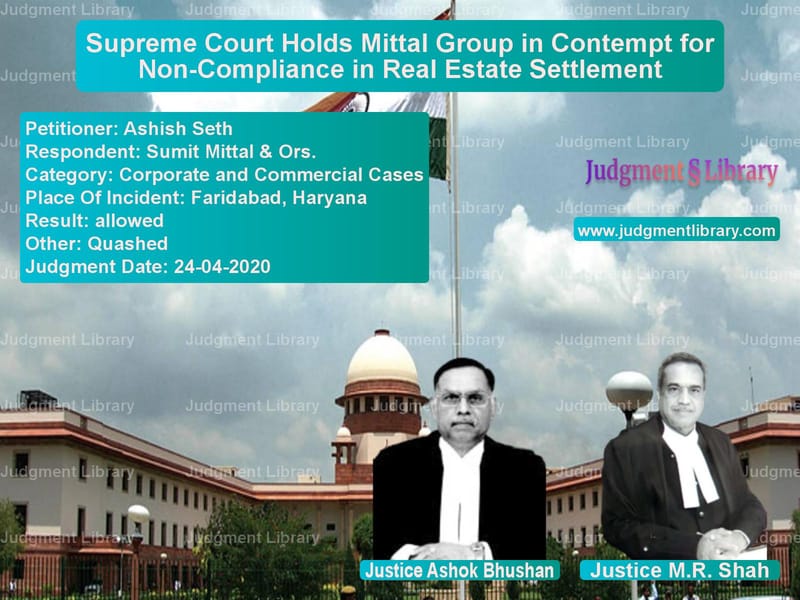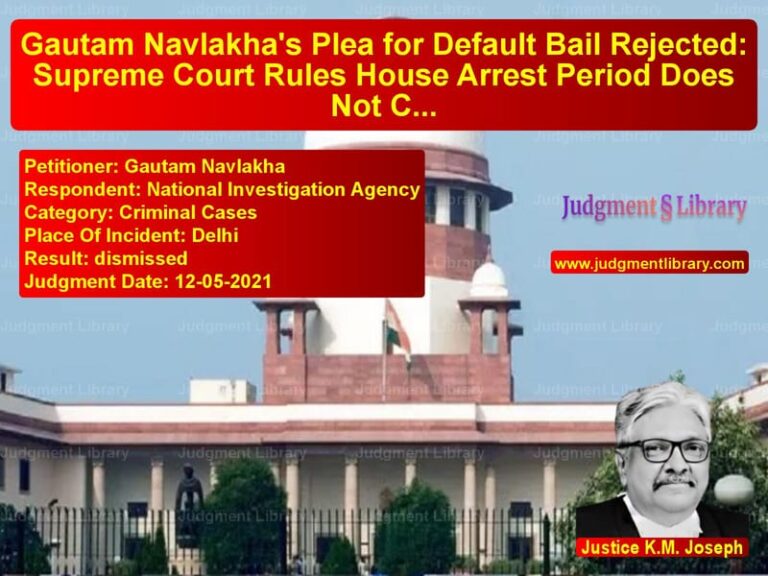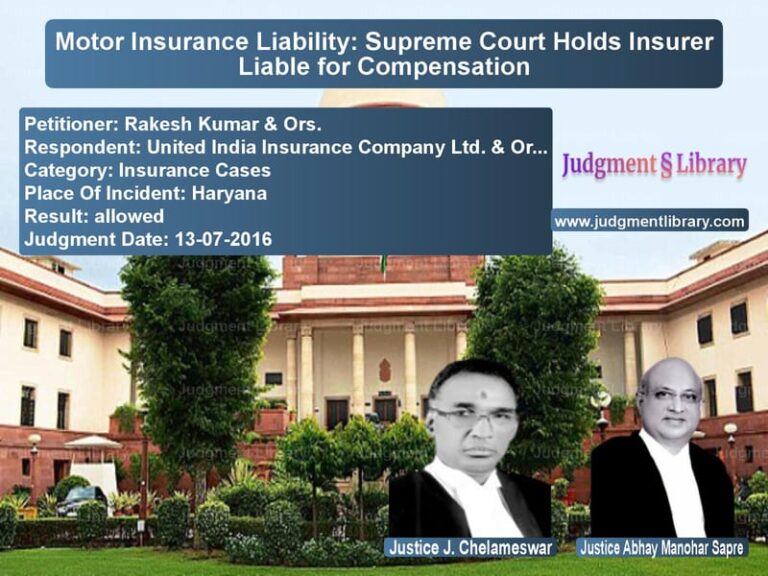Supreme Court Holds Mittal Group in Contempt for Non-Compliance in Real Estate Settlement
The Supreme Court of India recently adjudicated a contentious real estate dispute in the case of Ashish Seth vs. Sumit Mittal & Ors., which revolved around alleged violations of a Memorandum of Settlement (MoS) between two business groups, the Seth Group and the Mittal Group. The case was filed as a contempt petition after one of the parties accused the other of failing to fulfill its contractual obligations, despite a previous Supreme Court order endorsing the settlement.
Background of the Case
The dispute involved a joint venture company, Triveni Ferrous Infrastructure Private Limited (TFIPL), formed by two business groups—the Seth Group and the Mittal Group—for a real estate development project in Faridabad. The company had acquired significant land holdings and obtained licenses for development.
Over time, conflicts arose between the two groups regarding financial liabilities and project execution. These disagreements led to multiple legal proceedings, including criminal cases and writ petitions. Eventually, on May 4, 2015, both parties entered into a Memorandum of Settlement (MoS), outlining reciprocal obligations to be fulfilled. The Supreme Court ratified this settlement in its May 5, 2015 order, making it legally binding.
Despite the settlement, the Seth Group alleged that the Mittal Group had not complied with its obligations under the MoS, leading to contempt petitions.
Key Legal Issues Raised
- Did the Mittal Group fail to fulfill its obligations under the MoS?
- Was the non-compliance willful, thereby amounting to contempt of court?
- Could the Supreme Court enforce the MoS through contempt proceedings?
Petitioner’s Arguments (Seth Group)
The Seth Group contended that:
- They had fully complied with their obligations under the MoS, including depositing ₹9.40 crore towards External Development Charges (EDC).
- The Mittal Group was required to pay the balance EDC of ₹33.78 crore, which it failed to do, causing delays in license renewals and project approvals.
- The Mittal Group failed to execute a General Power of Attorney (GPA) and provide necessary board resolutions and approvals, obstructing the Seth Group’s ability to complete the project.
- The Mittal Group’s non-compliance was deliberate, causing hardship to homebuyers awaiting project completion.
Respondent’s Arguments (Mittal Group)
The Mittal Group defended itself by arguing that:
- They had not willfully violated the MoS but were facing administrative hurdles in fulfilling their obligations.
- The Seth Group was equally at fault, as they had not fully complied with the MoS regarding certain payments and project approvals.
- Recent orders by the Real Estate Regulatory Authority (RERA) had already addressed some of the disputed issues, making the contempt petition redundant.
- They had, in fact, provided necessary approvals and documentation, but the Seth Group had failed to utilize them appropriately.
Supreme Court’s Analysis and Judgment
The Supreme Court conducted a detailed review of the obligations outlined in the MoS and the subsequent compliance by both parties. The Court found that:
- The Mittal Group had failed to fulfill its commitments under the MoS, particularly regarding the payment of EDC and the issuance of necessary legal documents.
- Their inaction had directly impeded the completion of the project, affecting third parties, including homebuyers.
- As the Supreme Court had previously ratified the MoS, non-compliance constituted contempt of court.
- To ensure justice, the Court granted the Mittal Group a further two-month period to fulfill its obligations before proceeding with punitive measures under the Contempt of Courts Act.
Key Directions Issued by the Supreme Court
The Supreme Court ordered:
- The Mittal Group must pay the balance EDC of ₹33.78 crore within two months.
- The Seth Group must pay the remaining ₹25.27 crore of its share of the EDC.
- The necessary legal documents (GPA, board resolutions, and No Objection Certificates) must be executed by the Mittal Group.
- The Delhi Development Authority (DDA) and other regulatory bodies must expedite license renewals and project clearances.
- If obligations were not fulfilled within two months, the Court would initiate strict contempt proceedings against the Mittal Group.
Legal Takeaways from the Judgment
- Enforceability of Settlements: This ruling reinforces that court-approved settlements are legally binding and non-compliance can lead to contempt proceedings.
- Protection of Homebuyers: The judgment highlights the judiciary’s concern for homebuyers affected by delays in real estate projects.
- Contempt as an Enforcement Tool: The case establishes that contempt jurisdiction can be invoked for breach of contractual obligations when backed by court orders.
- Two-Way Accountability: While penalizing the Mittal Group for non-compliance, the Court also directed the Seth Group to meet its outstanding financial obligations.
Conclusion
This ruling underscores the importance of adhering to legally binding settlements and highlights the Supreme Court’s commitment to enforcing its orders. It sets a precedent for using contempt jurisdiction in cases where one party deliberately obstructs a legally agreed-upon settlement. The judgment also signals the Court’s growing concern for the plight of homebuyers and other third parties affected by real estate disputes.
Petitioner Name: Ashish Seth.Respondent Name: Sumit Mittal & Ors..Judgment By: Justice Ashok Bhushan, Justice M.R. Shah.Place Of Incident: Faridabad, Haryana.Judgment Date: 24-04-2020.
Don’t miss out on the full details! Download the complete judgment in PDF format below and gain valuable insights instantly!
Download Judgment: Ashish Seth vs Sumit Mittal & Ors. Supreme Court of India Judgment Dated 24-04-2020.pdf
Direct Downlaod Judgment: Direct downlaod this Judgment
See all petitions in Contract Disputes
See all petitions in Company Law
See all petitions in Bankruptcy and Insolvency
See all petitions in Judgment by Ashok Bhushan
See all petitions in Judgment by Mukeshkumar Rasikbhai Shah
See all petitions in allowed
See all petitions in Quashed
See all petitions in supreme court of India judgments April 2020
See all petitions in 2020 judgments
See all posts in Corporate and Commercial Cases Category
See all allowed petitions in Corporate and Commercial Cases Category
See all Dismissed petitions in Corporate and Commercial Cases Category
See all partially allowed petitions in Corporate and Commercial Cases Category







